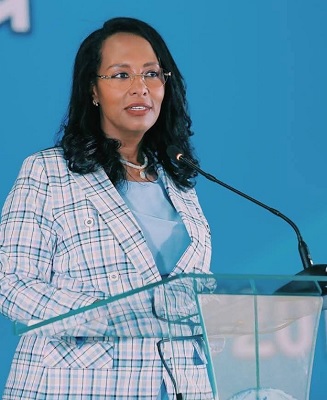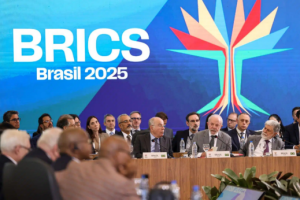
Under the dynamic leadership of Mayor Adanech Abebie, Addis Ababa is undergoing a rebirth. Once impeded by infrastructural bottlenecks and haphazard urban expansion, the city is now steadily transforming into a model of modernity, enhanced livability and economic vitality. The crowned first female mayor of Addis Ababa has not only met expectations—she has surpassed them. Her leadership exemplifies vision, tenacity and a deep commitment to equitable and inclusive progress.
Adanech’s journey from humble origins to the mayoral seat is nothing short of inspiring. She began her career as an elementary school teacher and quickly rose to administrative roles in Oromia’s Justice Bureau. Her aptitude for leadership became increasingly evident as she took on higher responsibilities—first in the Oromia Development Association, then in the national government as Minister of Revenue and Customs, and later as Attorney General. In each role, she upheld integrity, fought corruption, and drove reform. Her relentless pursuit of transparency within the Customs and Revenue Authority underscored her commitment to good governance.
When she served as Mayor of Adama—the very first woman in that office—she again demonstrated her reformist zeal: reducing corruption, enhancing service delivery, and elevating a mid-sized city’s governance standards. By the time she ascended to Mayor of Addis Ababa in late 2021, she had already built a sterling reputation for transformational leadership.
Addis Ababa’s Corridor Development Project has become the signature of her administration. Launched in April 2024, this ambitious metropolis-wide plan spans over 172 km of roads across two phases—complemented by pedestrian walkways, bike lanes, green spaces, smart poles and modern public utilities.
Mayor Adanech proudly reports the transformation: over 48 km of vehicle roads, 96 km for pedestrians, 100 km of bike paths, 32 parking lots for 6,369 vehicles, 85 transport terminals, and smart infrastructure such as 450 equipped poles—all achieved in a year under her leadership.
The results are palpable. Commuters who once endured 40 minute gridlocks now travel smoothly along redesigned corridors like Anbessa–Goro or Goro–Mebrat Hyle. Public plazas shimmer with new fountains; children’s playgrounds and green parks enrich community life; and vibrant commercial activity is palpable along major routes. In short, Addis Ababa is reemerging—sharper, cleaner, safer, and more spiritually in tune with its identity as Africa’s diplomatic capital.
Mayor Adanech’s model is centered on inclusion. Corridor projects have already generated more than 50,000 jobs—from manual labor to service provision. By pairing infrastructure with housing developments, small businesses, and transport facilities, she is knitting economic fabric throughout the city. No surprise that Addis Ababa is quickly demonstrating its global luster: from embassies to multinational investors, the city is projecting newfound confidence.
Her leadership effectiveness was further affirmed when she received the African Female Leader of the Year Award in March 2024—an honor recognizing her corruption-fighting reforms and governance excellence
No large-scale urban renovation comes without challenges. Some residents—especially in historic neighborhoods like Piassa and Kazanchis—have pointed to hurried evictions and concerns about adequate notice or compensation. Even so, the administration has made efforts to address these criticisms: allocating over 5 billion Birr, constructing 4,000 housing units, securing replacement land, and covering two years’ rent for affected families.
Transformation is not painless, but Adanech understands that its long-term fruits will outweigh short-term discomforts. Her challenge—and calling—is to ensure dialogue remains open and grievances are heard.
Mayor Adanech’s tenure is rooted in collaboration. She engages citizens, embassies, contractors, and security forces—urging the public to care for the corridor infrastructure as a shared asset. Her “Window of Africa” and Chaka mega-projects pay tribute to Addis’s global significance— melding culture, recreation, and green identity alongside diplomatic infrastructure.
Her governance style is hands-on, solution-driven and results-oriented—earning her nicknames like “Iron Lady” for her tireless work ethic. She blends visionary planning with results-driven execution: from customs reform and justice leadership to urban modernization and housing strategies.
As the Corridor Project nears its 2025 completion, Mayor Adanech must continue refining execution, embedding public participation and safeguarding social equity. Heritage sites require sensitive preservation amid modernization.
Yet, despite these challenges, Addis Ababa is already a testament to what purpose-driven leadership can achieve. Under Adanech’s leadership, Ethiopia’s capital stands tall on the world stage.
In short, Addis Ababa’s metamorphosis under Mayor Adanech fits a broader narrative of renewal, resilience, and responsible leadership. She is a true inspiration—an extraordinary woman whose bold vision and tireless work are shaping a stronger city and a brighter future for the nation.
BY WAKUMAN KUDAMA
THE ETHIOPIAN HERALD SUNDAY EDITION 15 JUNE 2025




